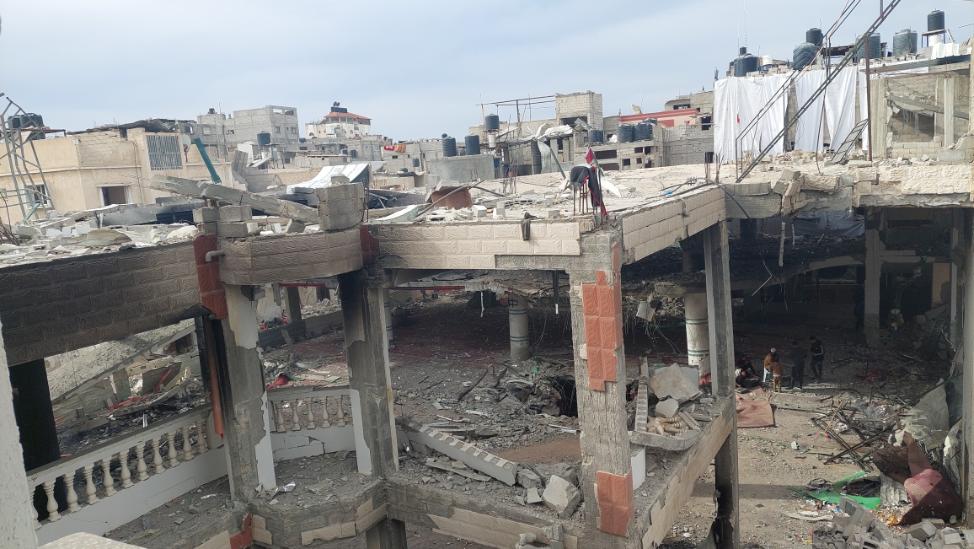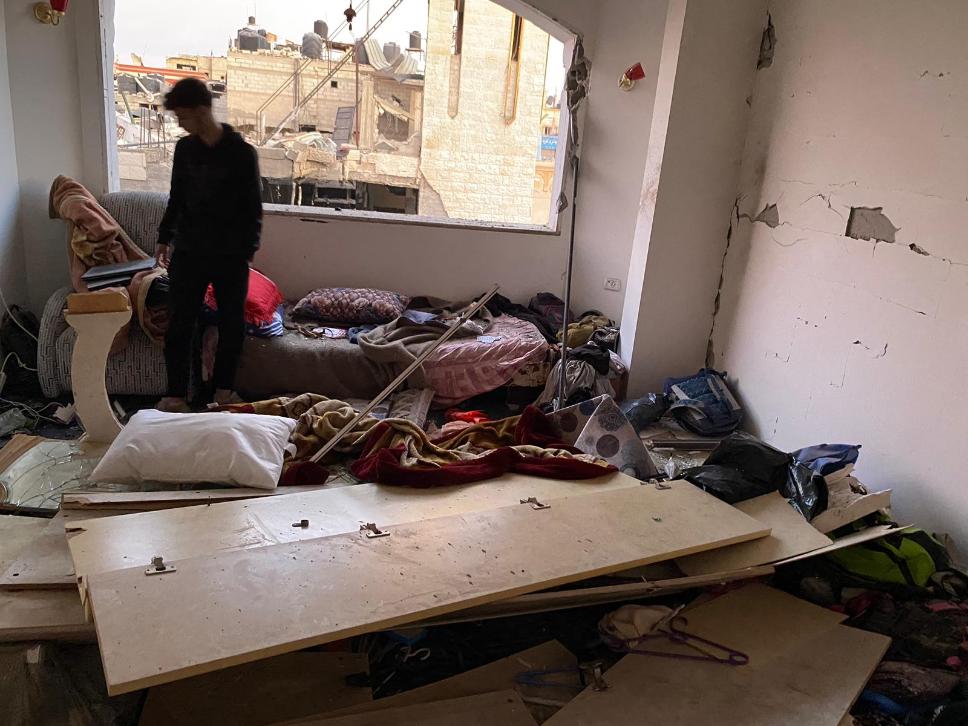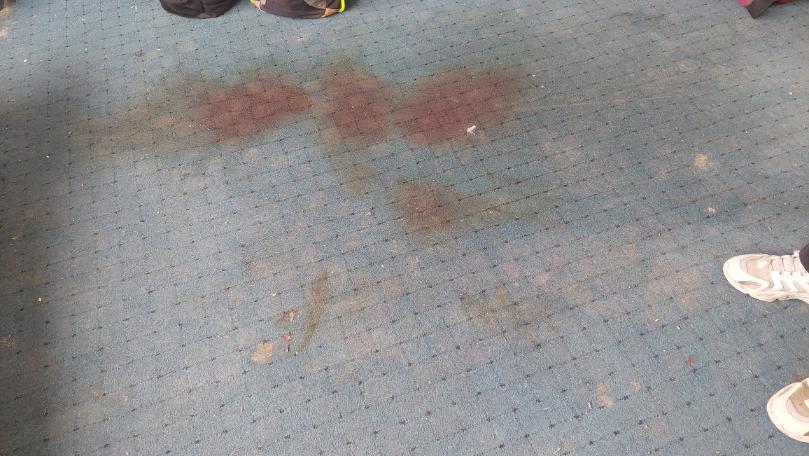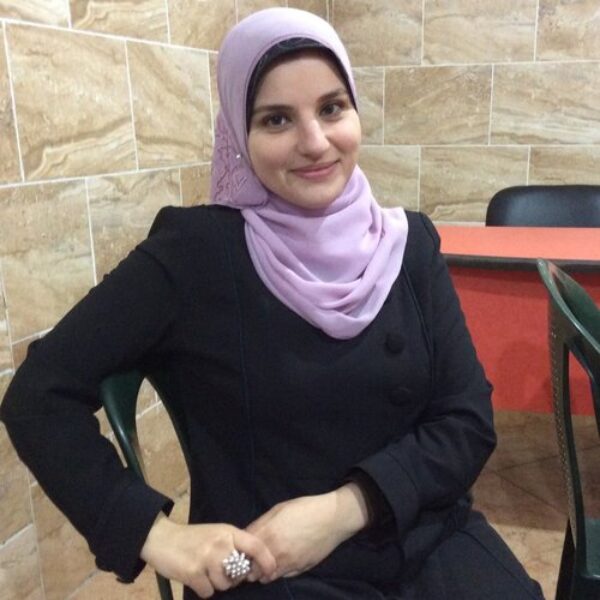
It was about 2 a.m. and all of Rafah was wide awake.
The high-pitched whine of drones filled the air. Low-altitude fighter jets roared in, and quadcopters smashed windows and walls. In the icy night, the ear-splitting sound of artillery filled the air.
While countries all over the world were celebrating Valentine’s Day, Israel was targeting Rafah with a series of bombings.
The explosions jolted me awake at my home near the Egyptian border, where I live with my husband and five children. Luckily, there was a network connection that night, so I could see the news.
The Israelis were targeting mosques in Rafah, as well as many houses. One of those mosques was Al-Hoda mosque, which is behind my family house in Yebna camp.
It was one of my worst moments. On the news, I saw the damage to my family’s and my cousin’s houses, and I saw the mosque in flames. I was so shocked, I could hardly dial the phone. Something awful must have happened to my family. Living there were my brothers, my cousins with their sons, and grandchildren and other relatives who had fled from many places because of the Israeli random bombings. In the adjacent home, which shared a wall, was another cousin who lived there with his wife, mother, and sister and her children and husband, who also fled from Gaza City.
I’d experienced the loss of my mother to coronavirus in Egypt, and I couldn’t bear the anguish of losing family again.
I called my brother Anas with urgency. It took many attempts to reach him, due to the bad connection.
“Are you alive?” I asked.
He replied, “Yes, but Ghada died, and there are some injuries.”
Ghada is my cousin and her husband is my cousin, too. A shy, beautiful woman, she was known for her soft voice and lovely smile. She was a mother of seven children. The oldest, Abdallah, is studying at a university in Germany, and the youngest, Omran, is just nine years old.

Ghada was sleeping in a big room with her children, husband, and parents-in-law. When they heard the first huge explosion, they jumped up and fled the room. Ghada was getting her hijab, but in a split second, a piece of shrapnel struck her head and she fell to the ground. The closets collapsed on top of her. Her husband and children shouted her name, searching for her. Then her husband found her under the rubble and frantically dug her out. He himself had a head injury. His mother was pushed toward them by the force of the explosions. It threw her down, breaking her right leg.
They rushed to the hospital and of course it was overcrowded with desperate people. Finally, a doctor saw Ghada. “She is hopeless,” he declared. “Send her to the tent,” he said, indicating a makeshift spot where the hospital workers were laying the deceased people.
But Ghada was still alive, still breathing. Her husband and son ran to the doctor, shouting and making problems, insisting that he look at her.
Finally, the doctor gave her oxygen. Ghada kept breathing for 40 more agonizing hours. Her son Omar was talking to her throughout, and she was trying to talk, too, but she couldn’t.
At last, she clasped his hand strongly. “A single tear rolled down from her eye, and I wiped it away for her,” Omar said. “As I helped her recite the testimony, she let out a laugh. After that laugh she passed away into the mercy of our lord.”
Her father had died two months ago, and she couldn’t see him because of the war. Now they can meet each other in another world, leaving this dark, miserable life behind. Her death was a shock to everyone. We consider this a nightmare, and we’re wishing for its end.
We don’t know when or how this war can be brought to an end. This Israeli attack on Gaza killed Ghada and tens of thousands of others, leaving many families missing loved ones and entire families erased entirely. Stop this attack on Gaza, stop killing us. We can’t stand any more, we can’t bear more.
Ghada’s sons refused to accept the death of their mother. They kept going to her grave in spite of the dangers they faced on their way; their eyes couldn’t stop filling with tears. Her husband, who was known for his smiling face, can’t smile anymore. He doesn’t yet know how he and his sons can adjust to this stage of life without Ghada.
Valentine’s Day is celebrated all over the world with warm feelings and a romantic atmosphere. In Gaza, it’s full of death, bloodshed, and anguish. On the night of Valentine’s Day, Ghada left her family, leaving her blood on the carpet in their bedroom. They find it difficult to clean up. They are sleeping in this room with their mother’s blood. There is no mercy or respect for any living human.











